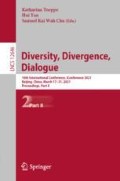Abstract
This article examines the resilient health information practices of lesbian, gay, bisexual, transgender, queer, intersex, and asexual (LGBTQIA+) individuals as agentic forms of buffering against minority stressors. Informed by semi- structured interviews with 30 LGBTQIA+ community leaders from South Carolina, our findings demonstrate how LGBTQIA+ individuals engage in resilient health information practices and community-based resilience. Further, our findings suggest that LGBTQIA+ communities integrate externally produced stressors. These findings have implications for future research on minority stress and resiliency strategies, such as shifting from outreach to engagement and leveraging what communities are doing, rather than assuming they are lacking. Further, as each identity and intersecting identities under the LGBTQIA+ umbrella has unique stressors and resilience strategies, our findings indicate how resilience strategies operate across each level of the socio-ecological model to better inform understanding of health information in context.
Access this chapter
Tax calculation will be finalised at checkout
Purchases are for personal use only
References
Hatzenbuehler, M.L., Panchankis, J.E.: Stigma and minority stress as social determinants of health among lesbian, gay, bisexual, and transgender youth: Research evidence and clinical implications. Pediatric Clinics 63(6), 985–997 (2016)
Meyer, I.H.: Prejudice, social stress, and mental health in lesbian, gay, and bisexual populations: conceptual issues and research evidence. Psychol. Bull. 129(5), 674–697 (2003)
Savolainen, R.: Everyday information practices: a social phenomenological perspective. Scarecrow Press, Lanham (2008)
Toomey, R.B., Ryan, C., Diaz, R.M., Russell, S.T.: Coping with sexual orientation-related minority stress. J. Homosex. 65(4), 484–500 (2018)
Martinez-Donate, A.P., et al.: Does acculturative stress influence immigrant sexual HIV risk and HIV testing behavior? Evidence from a survey of male Mexican migrants. J. Racial Ethnic Health Disparities 5(4), 798–807 (2018)
Utamsingh, P.D., Richman, L.S., Martin, J.L., Lattanner, M.R., Chaikind, J.R.: Heteronormativity and practitioner–patient interaction. Health Commun. 31(5), 566–574 (2016)
Meyer, I.H.: Resilience in the study of minority stress and health of sexual and gender minorities. Psychol. Sex. Orientation Gender Diversity 2(3), 209–213 (2015)
Glanz, K., Bishop, D.B.: The role of behavioral science theory in development and implementation of public health interventions. Annu. Rev. Public Health 31, 399–418 (2010)
McLeroy, K.R., Bibeau, D., Steckler, A., Glanz, K.: An ecological perspective on health promotion programs. Health Educ. Q. 15(4), 351–377 (1988)
Bry, L.J., Mustanski, B., Garofalo, R., Burns, M.N.: Resilience to discrimination and rejection among young sexual minority males and transgender females: a qualitative study on coping with minority stress. J. Homosex. 65(11), 1435–1456 (2018)
Crenshaw, K.: Mapping the margins: Intersectionality, identity politics, and violence against women of color. Stanford Law Rev. 43, 1241–1300 (1990)
Pohjanen, A.M., Kortelainen, T.A.M.: Transgender information behaviour. J. Doc. 72(1), 172–190 (2016)
Colpitts, E., Gahagan, J.: The utility of resilience as a conceptual framework for understanding and measuring LGBTQ health. Int. J. Equity Health 15(1), 1–8 (2016)
Lerner, J.E., Robles, G.: Perceived barriers and facilitators to health care utilization in the United States for transgender people: a review of recent literature. J. Health Care Poor Underserved 28(1), 127–152 (2017)
Kitzie, V.L., Wagner, T.L., Vera, A.N.: In the beginning, it was little whispers…now, we’re almost a road”: conceptualizing a model for community and self in LGBTQ+ health information practices. In: Sundqvist, A., Berget, G., Nolin, J. (eds.) iConference 2020, LNCS, vol. 12051, pp. 15–31. Springer, Cham (2020). https://doi.org/10.1007/978-3-030-43687-2_2
Hillary, G.A.: Definitions of community: areas of agreement. Rural Sociol. 20, 111–123 (1995)
McMillan, D.W., Chavis, D.M.: Sense of community: a definition and theory. J. Community Psychol. 14(1), 6–23 (1986)
Greyson, D., O’Brien, H., Shoveller, J.: Information world mapping: a participatory arts-based elicitation method for information behavior interviews. Libr. Inf. Sci. Res. 39(2), 149–157 (2017)
Gibson, A.N., Martin III., J.D., : Re-situating information poverty: Information marginalization and parents of individuals with disabilities. J. Am. Soc. Inf. Sci. 70(5), 476–487 (2019)
Floegel, D., Costello, K.L.: Entertainment media and the information practices of queer individuals. Libr. Inf. Sci. Res. 41(1), 31–38 (2019)
Vera, A.N., Wagner, T.L., Kitzie, V.L.: When it’s time to come together, we come together”: reconceptualizing theories of self-efficacy for health information practices within LGBTQIA+ communities. In: Jean, B.S., Jindal, G., Liao, Y., Jaeger, P.T. (eds.) Roles and Responsibilities of Libraries in Increasing Consumer Health Literacy and Reducing Health Disparities, vol. 47, pp. 263–282. Emerald Publishing Limited (2020)
Halberstam, J.: The queer art of failure. Duke University Press, Durham (2011)
Author information
Authors and Affiliations
Corresponding author
Editor information
Editors and Affiliations
Rights and permissions
Copyright information
© 2021 Springer Nature Switzerland AG
About this paper
Cite this paper
Lookingbill, V., Vera, A.N., Wagner, T.L., Kitzie, V.L. (2021). “We Can Be Our Best Alliance”: Resilient Health Information Practices of LGBTQIA+ Individuals as a Buffering Response to Minority Stress. In: Toeppe, K., Yan, H., Chu, S.K.W. (eds) Diversity, Divergence, Dialogue. iConference 2021. Lecture Notes in Computer Science(), vol 12646. Springer, Cham. https://doi.org/10.1007/978-3-030-71305-8_1
Download citation
DOI: https://doi.org/10.1007/978-3-030-71305-8_1
Published:
Publisher Name: Springer, Cham
Print ISBN: 978-3-030-71304-1
Online ISBN: 978-3-030-71305-8
eBook Packages: Computer ScienceComputer Science (R0)

